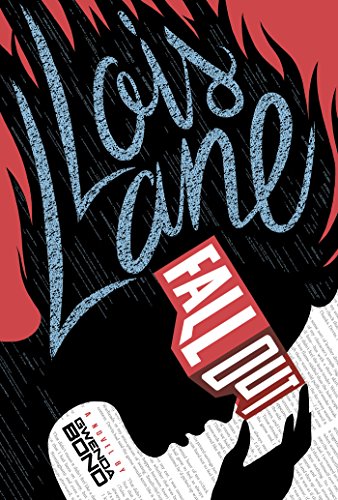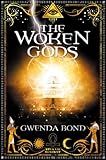Today, Gwenda Bond stops by FanLit to chat about her newest novel, Lois Lane: Fallout, which I thought was both a fantastic story and a refreshing take on some old YA stereotypes. She was kind enough to answer some questions I had about the book and her writing process, and one lucky U.S.-based commenter will win a copy of Lois Lane: Fallout!

Gwenda Bond
Jana Nyman: The narrative of Lois Lane: Fallout is told strictly from Lois Lane’s perspective. Did this provide any challenges for you as the author, or did it make writing this story easier?
Gwenda Bond: Every point-of-view has its advantages and drawbacks. First person is especially good for staying close to a character and letting us see the world through their eyes. And, of course, novels have the edge on other forms of storytelling in terms of the ability to truly showcase a character’s interior life. YA also features characters in the pressure cooker of becoming who they are. My editor suggested I use Lois’s first person POV for the book, and for the reasons I’ve mentioned, I definitely think it was the right call. Her voice came relatively easily and is a delight to write in, and following her as she investigates/reports the story means the reader gets information at the same time she does.
You’ve mentioned Margot Kidder’s on-screen portrayal of Lois Lane as an inspiration — both personally and when writing Fallout. Were there any other influences which guided your character creation or writing process? If so, how did you fold them in?
This is both a hard and easy question. In some ways, it feels like this was the project I was born to write. I was able to draw on a lot of the elements I love most — girl detective stories, ambitious female characters, an ensemble cast aka Scooby Gang, banter between friends and potential love interests, and fun, high stakes science fiction, to name the big ones. I suppose it would be most honest to say my process was guided by my own personality and the influences that helped shape it. We often talk about writing the books we want to read, and I wanted this to be that sort of Lois story.

Margot Kidder in Superman
One of the aspects of Fallout that I enjoyed was Lois’ reliance on other characters and her desire to befriend them, regardless of gender or race. Also of particular note to me was the active presence of adults in Lois’ life. In many YA novels, authors seem to fall back on established tropes like “the Special Snowflake,” who is automatically the best at whatever she tries her hand at, or absentee parents who ensure that the protagonist’s actions go unquestioned and unpunished. Did you make a conscious decision to buck those tropes, or did the story naturally evolve this way?
Thank you. There’s a really a wide range of stories in YA right now — we’re truly in a golden age and have been for some time. So I think there are those books you describe, but many of my favorite YA novels do have adults present and significant. My books are primarily about teens, but adults are a huge part of teens’ lives. And I don’t subscribe to the idea that teens aren’t interested in them (er, us). If the adults in question are boring, none of us will be interested but otherwise, why not? Our families — for better or for worse — are part of shaping who we become. All of my work has tended to explore that tension, directly or indirectly. It seems to emerge organically.
 Your novels tend to center around clever young women who, upon finding themselves in seemingly impossible situations, must use their wits to save themselves and their friends. What draws you to this kind of character?
Your novels tend to center around clever young women who, upon finding themselves in seemingly impossible situations, must use their wits to save themselves and their friends. What draws you to this kind of character?
These are the kind of stories I most love to read or watch! I was just joking the other day about Game of Thrones, and how one of the ways I know I’m truly a YA author at heart is that I’d much prefer it to just be the Arya Stark show (or perhaps the Dany and Arya show, where they team up with dragons and sword to right all wrongs in Westeros — the dire wolves can stay too, and Brienne). More seriously, I am — and I think many people are — still hungry for more stories like this, about smart, complicated girls saving the day, for whatever definition of saving the day applies, from quieter personal stakes to loud world-in-peril ones and every combination thereof.
While reading about Lois’ efforts to uncover the truth behind the Warheads’ behavior, I was strongly reminded of the “girl detective” stories I loved as a teenager — Nancy Drew, Trixie Belden, Sally Lockhart, etc. Though Lois is a born journalist, she must (necessarily) do a fair amount of sleuthing in order to write articles. Was this type of connection intentional on your part, or a happy accident?
Definitely not an accident. I love those stories too, and fearless, inquisitive Lois is such a perfect fit for that kind of story.
In Fallout, there are many nods to strange occurrences, both within Metropolis and the wider world beyond it — as well as the complicated long-distance relationship between Lois and SmallvilleGuy. Do you plan to write more about Lois Lane, and if so, did that affect how you structured the plot and character details in Fallout?
I knew going in that Fallout had the potential to turn into a series. I definitely wanted the book to stand on its own, while leaving room for future stories, and I’m delighted that people seem eager for more. And I will say no more except to twirl my fingers and laugh evilly.
 The Metropolis of Fallout is one with laptops, cell phones, and holographic gaming devices. Was it difficult for you to balance real-world technology with futuristic, experimental tech? Did you do any specific research?
The Metropolis of Fallout is one with laptops, cell phones, and holographic gaming devices. Was it difficult for you to balance real-world technology with futuristic, experimental tech? Did you do any specific research?
I did a very small amount of research on VR and video games (which I am officially the worst at — though I will happily unearth classic Atari for a round of Adventure or Pitfall any time). I have always loved spy stories and science fiction, both of which tend to come with lots of fun gadgets. I knew I wanted some invented tech in the mix, alongside more familiar items we already have. Old and new things side by side are such a part of our own lives, I felt like it would help flesh out the texture of the world. Having some tech that doesn’t actually exist yet will also hopefully help the book age more gracefully.
 A new feature of our Author Interviews is that we’ve been asking authors about their favorite cocktail recipes — either as they relate to the author’s creative process (as a relaxation aid while writing, for example) or something involved with their work. Are there any cocktails which remind you of Lois Lane (as an adult, naturally) or any drinks which you enjoyed to reward yourself for making progress with the manuscript?
A new feature of our Author Interviews is that we’ve been asking authors about their favorite cocktail recipes — either as they relate to the author’s creative process (as a relaxation aid while writing, for example) or something involved with their work. Are there any cocktails which remind you of Lois Lane (as an adult, naturally) or any drinks which you enjoyed to reward yourself for making progress with the manuscript?
Well, I love a good champagne cocktail, which is just the bubbly, a sugar cube, some angostura bitters, and a citrus twist garnish. Which (grown-up) Lois would surely deserve after getting a scoop or winning her latest Pulitzer.
Many thanks, Ms. Bond, for taking the time to answer a few questions and confound me with evil laughter! I’m looking forward to reading more of your work, particularly if it involves feisty girl reporters.
Readers, comment below for a chance to win a copy of Lois Lane: Fallout, out now from Switch Press. (U.S.-based addresses only, please.)



I would love to win a copy of this book! It sounds amazing!
I’ve heard such good things about this book! Interesting interview, and thanks for the giveaway
Well, I probably wouldn’t have picked this one up as it would normally not be on my radar. However, after reading this I’ve now added it to my list. I love the idea of strong female detectives who are smart enough to rely on others for things that they do best instead of trying to do it themselves and witty banter and mixed cast and Scooby Gang? Yep, had to add it!
Great interview! It definitely sparked my interest in the book. I would love to win a copy!
April, you win a copy of Lois Lane; Fallout!
Please contact me (Marion) with your US address and I’ll have the book sent right away. Happy reading!